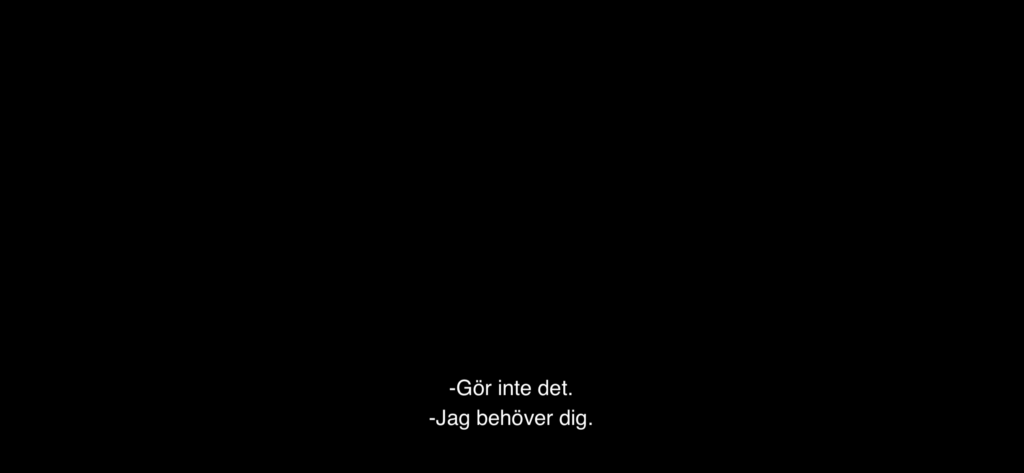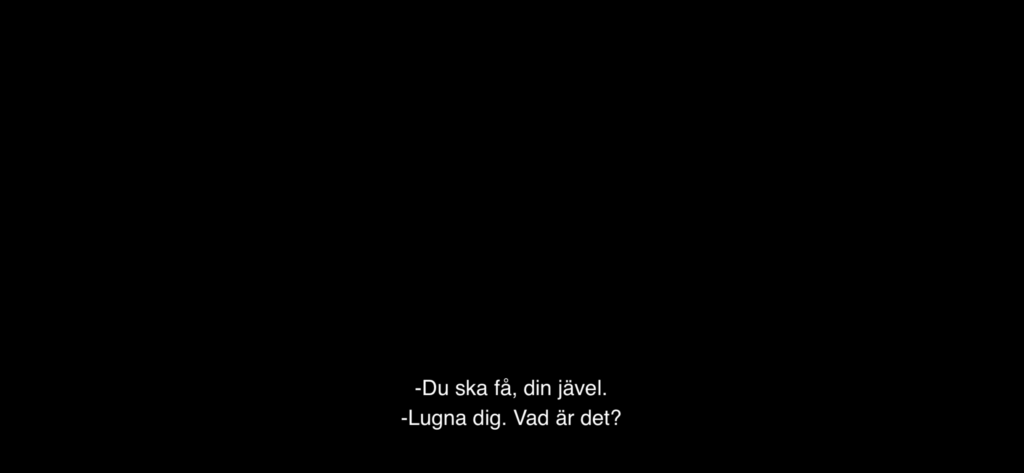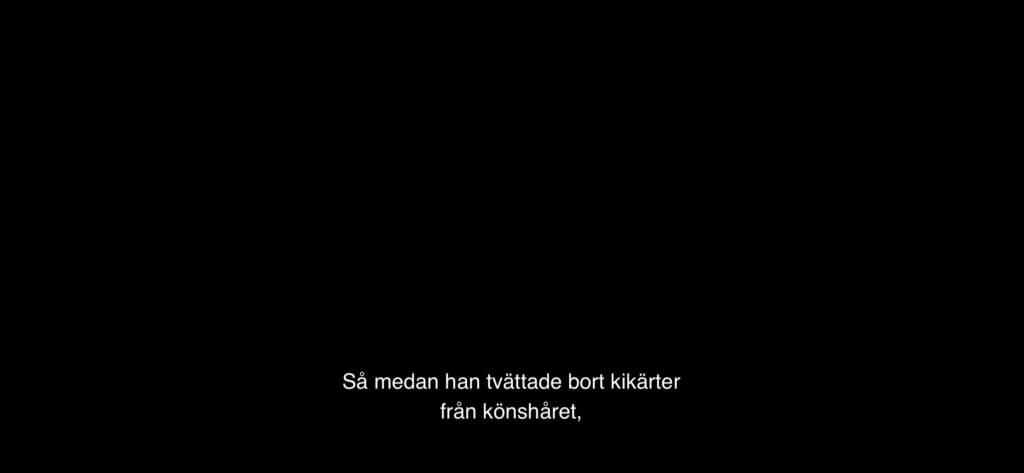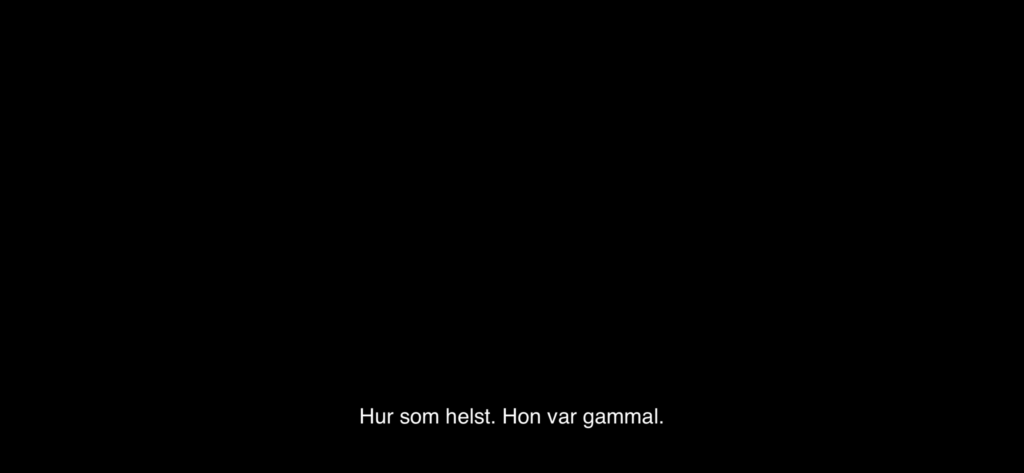



(Jag har inställt på min telefon att den ska ta en skärmdump när man dubbelknackar på baksidan (iOS: Settings / Accessibility / Touch / Back Tap). Ibland händer det av misstag.)
There are 451 posts filed in Uncategorized (this is page 4 of 46).
Det kom lite som en överraskning att Nick Harkaway (född Nicholas Cornwell) är son till John le Carré (född David Cornwell). Jag läste den förres Titanium Noir (gillade) i somras och har tidigare försökt med Gnomon (fastnade inte, men kanske ska göra ett nytt försök). Det är först nu när Nick H börjat nämna det i sitt nyhetsbrev – idag apropå att han skriver på en le Carré/George Smiley-uppföljare – som poletten har trillat ner.
Ett Missiverna på övertid skickades häromdagen, från Rojava till Kastlösa.
(Det kanske ser ut som att det har gått ut jättemånga missiv sedan sist pga högre löpnummwr men det beror på att jag importerade arkiv från TinyLetter.)
Året var 1803, William och Dorothy Wordsworth vandrade i Skottland tillsammans med Samuel Coleridge. Vid en gruvby såg de på avstånd vad som kanske var deras första syn av en ångdriven maskin:
When we drew nearar [writes Dorothy Wordsworth] we saw, coming out of the side of the building, a large machine or lever, in appearance like a great forge-hammer, as we supposed for raising water out of the mines. It heaved upwards once in half a minute with a slow motion, and seemed to rest to take breath at the bottom, its motion being accompanied with a sound between a grown and jike. There would have been something in this object very striking in any place, as it was impossible not to invest the machine with some faculty of intellect; it seemed to have made the first step from brute matter to life and purpose, showing its progress by great power. William made a remark to this effect, and Coleridge observed that it was like a giant with one idea.
Journals of Dorothy Wordsworth, 19 augusti 1803
(Coleridge verkar också ha gillat sin sägning, då han återanvände den för att beskriva sin kompis Thomas Clarkson som var helt upptagen av att avskaffa slaveriet.)
Apropå Samuel R. Delany som nämndes tidigare, så upptäckte jag just att Andrzej Tichý kommer att prata honom på Kulturhuset 21 november.
Här är några böcker — gamla som nya, fiktiva som icke-fiktiva — som har plockats upp på diverse håll (recensioner, nyhetsbrev, poddar, m.m.) på sistone:
…är det en grej? Var kan man läsa/förstå mer? Från en drömmig artikel om Tove och Hanna Folkesson i DN idag:
Hanna har undervisat i porträttmåleri och eko-bygge, hennes dröm är att ha kurser i intuitivt byggande i huset. Förmedla känslan av att det är enkelt, speciellt till kvinnor som sällan har haft möjlighet att bygga sina egna rum.
“Fruarna Folkesson: ‘Vi försöker blåsa liv i det vackraste vi kan tänka oss’“, DN, 6 augusti 2023
Marisa Libbon gräver i luften i sin essä “An archeology of air” och knyter ihop berättelsen om den medeltida dansk-engelska kungen Havelok, hur orden och ryktena färdades i luften över Nordsjön och hur luft har skördats med hjälp av väderkvarnar och gigantiska vindparker till havs (som Hornsea 1-3 utanför Grimsby).
An archaeology of the air turns up old sounds and voices, dreams and experiments that we sometimes mistake for our own. It holds the versions of history we’ve cast off, but have influenced us all the same. We think of air as preservation’s nemesis, eating away at the past’s last traces. The ground preserves objects as they were in their own time. The air preserves artifacts in transit. Carried from place to place, era to era; always in the process of becoming, of changing. Air spun rapidly and relentlessly enough can power a 21st-century city. But air, when marshaled and then excavated, can tell us things about the lives and sounds and movements that existed between the past’s tangible relics, and in so doing, can tell us something about ourselves.
Marisa Libbon, “An archeology of air“, European Review of Books, 19 april 2023
Libbon har tidigare skrivit boken Talk and Textual Production in Medieval England och har boken Cultures of Power på gång, om just väderkvarnens inflytande på medeltida Englands fysiska och mentala landskap.
Jenny Turner i London Review of Books om en översatt utgåva av Fleur Jaeggys The Water Statues (Le statue d’acqua).
Fashion, the It-girl Alexa Chung once said, is just what happens when you have been wearing one thing for ages, then get bored with it. Is this the reason Jaeggy has become so fashionable, because readers are tired of big books and humanist fiction, all that inwardness that isn’t really inward, all those vulgar, boring families with ‘all of the advertising’, as Jaeggy once put it, ‘on their side’? Chung again, explaining a ‘sensation’ she gets from clothes she becomes ‘obsessed with’: ‘At first I find them almost grotesque, they make me feel a bit sick. Then I look at them again, and realise it’s not repulsion, but desire.’
Jenny Turner, “Like a Washed Corpse“, London Review of Books, 27 juli 2023
I samma nummer av LRB, Mike Jay om boken Elixir: A Story of Perfume, Science and the Search for the Secret of Life av Therese Levitt.
In Elixir, Theresa Levitt tells the entwined stories of the Laugier family and the development of perfume in the first decades of what in the early 19th century would come to be called ‘organic chemistry’. The long tradition of isolating plant essences, she argues, played an underappreciated role in these discoveries. Smell has always been a crucial diagnostic sense, the one that brings us closest to the fundamental properties of matter, and the evolution of perfume follows an unbroken narrative thread that extends from alchemy to modern industrial chemistry.
Mike Jay, “In the Alchemist’s Den“, London Review of Books, 27 juli 2023
Också från LRB, om boken och terapisekten The Sullivanians: Sex, Psychotherapy and the Wild Life of an American Commune av Alexander Stille:
But perhaps the last word should go to Newton’s daughter Esther, who summed up the group’s mixture of aspiration and mediocrity with admirable bluntness: ‘They combined the worst of Marxism, psychoanalysis and the musical theatre.’
James Lasdun, “Chumship“, London Review of Books, 27 juli 2023
Det kanske är mest på engelska från USA som man stöter på allt fler böcker av filosofer som är mer personligt präglade och utifrån filosofiska idéer reflekterar över hur man kan/bör leva. Crispin Sartwell nämner Agnes Callard (Aspiration: The Agency of Becoming, men främst genom essäer i The Point och The New Yorker (porträtt och “The Case Against Travel“) / Intervju med Ezra Klein), John Kaag (bl.a. Hiking with Nietzsche: On Becoming Who You Are, American Philosophy: A Love Story och Henry at Work: Thoreau on Making a Living), Clancy Martin (How Not to Kill Yourself: A Portrait of the Suicidal Mind), Skye Cleary (How to Live a Good Life: A Guide to Choosing Your Personal Philosophy och How to Be Authentic: Simone de Beauvoir and the Quest for Fulfillment), Justin E. H. Smith (bl.a. The Internet Is Not What You Think It Is: A History, a Philosophy, a Warning, men kanske främst hans Substack “The Hinternet“, varmt rekommenderad), Kieran Setiya (Midlife: A Philosophical Guide och Life Is Hard: How Philosophy Can Help Us Find Our Way) och Costica Bradatan (bl.a. In Praise of Failure: Four Lessons in Humility), men också New York Times-bloggen “The Stone“, i “The New Hellenism” hos Los Angeles Review of Books. Den första jag kommer att tänka på i Sverige är Jonna Bornemark men det finns så klart fler.
Then again, these new ways of writing and of using philosophical ideas are only getting started. They may well have significant implications about the nature of knowledge or the free will problem, come to think of it. Perhaps the personal and the public will provide essential routes of progress for traditional questions, or will lead to new sorts of answers. But maybe that hasn’t quite happened yet. Either way, however, and even as philosophy as an academic discipline is again endangered by budget cuts and considerations of prestige and practicality, there is no doubt that the new philosophy has brought in its train a much-needed renewal of urgency, energy, and sense of practical purpose. And it certainly brings the field some much better writing and some much more pleasurable reading.
Crispin Sartwell, “The New Hellenism“, Los Angeles Review of Books, 21 juli 2023
Inspelning från symposiet “Spinoza och början på den judiska upplysningen” som ägde rum i Stockholm i maj (och som jag hade biljetter till men GLÖMDE BORT). Jonathan Israels tegelstensbiografi (1344 sidor!) över Spinoza kommer snart ut.
Junot Diaz om Octavia Butler och hennes Kindred (och TV-serifieringen av den):
Kindred is thus simultaneously a time-travel story and a neo-slave narrative. Butler literalizes what’s implicit in the genre—after all, isn’t every neo-slave narrative a time-travel story? But don’t let the temporal hijinks confuse you: this is no Terminator fantasy; even 1962’s La Jetée seems downright cheery by comparison. Kindred, for my money, is second only to Morrison’s Beloved (1987) in approximating the insane everyday nightmare that was American slavery. How it ate flesh, how it ate souls, how it ate presents, how it ate futures. In Butler’s deft hands every moment that Dana spends in the past is torqued with dread, with the imminence of arbitrary annihilation. The real question is not whether the violation will come—it will—or if it will kill you (always a possibility), but whether it will shatter your humanity forever.
Junot Diaz, “Octavia Butler’s Blasphemous Solidarities“, Boston Review, 20 juni 2023
(Deborah Chasman var redaktör för Junot Diaz hos Boston Review när Diaz för några år sedan blev anklagad för sexuella trakasserier. Hon skriver insiktsrikt om det i “My #MeToo Moment“).
Octavio Butlers och Samuel R. Delanys vägar korsades. Delany porträtteras i The New Yorker. Han är en helt ny bekantskap för mig, men blir nyfiken på hans Dhalgren:
“Dhalgren” both is and is not difficult to read. The Kid, a twenty-seven-year-old poet who has forgotten his own name, wanders through the city—where streets change places, and a second moon appears—equipped with a notebook and a multi-bladed weapon called an orchid. A series of encounters befall him: sex with men and women in parks and abandoned buildings; barroom chats with draft dodgers, an astronaut, and other refugees from the outside world; and a stint working for a middle-class family who, like zombies, go on reënacting their drab daily routines in denial of the surrounding catastrophe. Somehow, while mired in a fugue that never lifts, the Kid becomes a legend, publishing a book of poetry with the help of an Auden-like visitor and assuming leadership of a multiracial street gang that loots houses and department stores while cloaked in holographic shields. Delany never resolves whether Bellona’s strange distortions are artifacts of the Kid’s psyche or glitches in the city itself, “the bricks, and the girders, and the faulty wiring and the shot elevator machinery, all conspiring together to make these myths true.”
Julian Lucas, “How Samuel R. Delany Reimagined Sci-Fi, Sex, and the City“, The New Yorker, 3 juli 2023
Jag läste Mackenzie Warks autoteoretiska Raving efter att ha läst den här recensionen:
Raving, a narrated microethnography that pulses forward with alacrity, is an enjoyable read. Wark is a deft writer with an eye for detail, the kind of person who notices a grate in the ground and listens for the ocean below. Raves occur in the Brooklyn neighborhood of Bushwick, almost always literally and a couple of times “psychogeographically”; these spaces are generally tight-knit and moderately gatekept, with flyers posted on private Instagrams and disseminated via Telegram group chats. Wark’s “rave crew” of friends and lovers is similarly semi-anonymized, reduced to referential letters. Unnaming turns characters into avatars readers can more readily envision in their own lives, occasionally at the expense of clarity (wait, so what happened between Wark and J? Does C like F or was that Z?). Exceptions are made for a few friends quoted as theorists or working the rave, bartending and designing lights, as bouncers and ticket takers and DJs.
Vivian Medithi, “Quantum Mechanics: On McKenzie Wark’s ‘Raving’“, Los Angeles Review of Books, 29 juni 2023
Ett möte med David Keenan (bl.a. This Is Memorial Device, Monument Maker och England’s Hidden Reverse: A Secret History of the Esoteric Underground):
There were no throwaway niceties. Keenan speaks as he writes: with great speed and absolute conviction. Over the course of the afternoon our conversation topics included the mystical pull of Airdrie; his lifelong fascination with the occult; his reverence of Lester Bangs, Roberto Bolaño and William Blake; and what could loosely be referred to as his writing “process” – a state he described as bursts of intense creative mania, bordering on possession. It isn’t a metaphor, he stressed, when he said that his books often feel as if they were written by an unseen force. Over the years, he has come to see them as “organisms in a way. They’re moving and pliable. You’re dealing with something that doesn’t have a fixed point.”
Francisco Garcia, “The Cult of David Keenan“, The New Statesman, 3 juni 2023
En intervju med Lorraine Daston utifrån hennes bok Rules: A Short History of What We Live By.
Thick rules are rules that come upholstered with all manner of qualifications, examples, caveats, and exceptions. They are rules that are braced to confront a world in which recalcitrant particulars refuse to conform to universals—as opposed to thin rules, of which algorithms are perhaps the best prototype: thin rules are formulated without attention to circumstances. Thin rules brook no quarter, they offer no sense of a variable world. Many bureaucratic rules, especially bureaucratic rules in their Kafkaesque exaggeration, also fit this description.
“Cooking, Monasteries, Arithmetic: Lorraine Daston on the History of Rules“, Public Books, 19 maj 2023
Bara genom att läsa den här essän om Rebecca May Johnsons bok Small Fires: An Epic in the Kitchen får jag lust att laga mat, och läsa om matlagning, och skriva om matlagning.
The book emerged while Johnson was working on a PhD dissertation on German poet Barbara Köhler’s rewriting of the Odyssey, a process that led her to understand cooking as a cousin of translation. She uses the idea of reception—how texts are read and reimagined—to argue for a more serious consideration of the recipe form: “My ‘reception’ of the recipe—my intervention into the tradition of recipe reception—is to translate text into food. Each time I cook the recipe I produce a new translation of the text.” Just as translation has long been undervalued by critical and academic establishments, the recipe is “a form of knowledge that is often denied the status of knowledge.”
“Mother Sauce” av Marian Bull hos n+1, 15 juni 2023